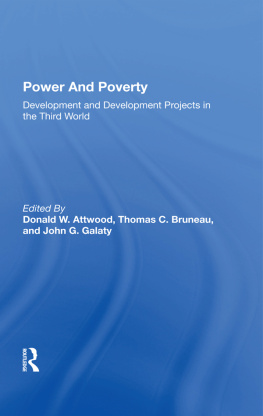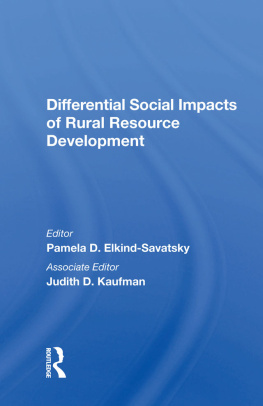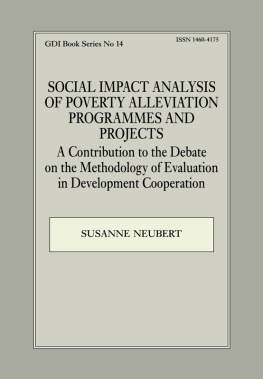Donald W. Attwood, Thomas C. Bruneau , and John G. Galaty
The case studies in this book concern the impact of development projects on societies at various levels of affluence and modernization. They demonstrate the variety of such projects, and the ecological, economic, political and social contexts within which development is attempted but seldom achieved. Indeed, results depend on whether projects are in conflict with these contexts or with other societal goals.
One long-standing question on goals is whether efforts to achieve economic growth can be made compatible with social justice. Some per capita growth is necessary if objectives such as reducing poverty, increasing life expectancies, etc., are to be achieved; but growth in and of itself does not guarantee better livings for the poor. To illustrate these larger issues and to better understand the impact of development projects in widely varying contexts, we commissioned these chapters. Here we shall review the themes which link the chapters together.
State Involvement and International Intervention
In all chapters the predominant role of the state in development is evident. This is true for colonial states in India and Kenya as well as independent nations such as Brazil, Sri Lanka and Upper Volta. Through development schemes, irrigation projects, seed and credit programs, etc., the current role of the state is obvious and paramount. This is in contrast to states which were less interventionist during the earlier industrialization of the West. Today Third World states are active in all aspects of the development process, not only as regulators but also as instigators. This is due to at least three factors:
1. The industrial bourgeoisie, which was crucial for economic development in the West, is missing or weak in many Third World countries today. Due to their precolonial and colonial histories, they are more likely to have linked or dependent bourgeoisies. Thus, if development is to take place, it may fall to the central institution of power, the state, to promote it. States do indeed seek development, some out of genuine concern for their citizens and all to become stronger vis--vis neighboring and potentially hostile countries.
2. Third World countries are today seeking to develop when the first and second worlds are already industrialized; they are latecomers. Technology is already elaborated, financial systems are fully defined and markets are in place. It is both easier and more difficult to break into the development process today than it was a century ago: easier in that technology and financing are available and international institutions in place; more difficult in that these systems are already tied up and Third World countries must enter on adverse terms. Consequently, it seems that the entity with the greatest degree of coherence and controlthe statemust deal with the external environment in seeking to promote development.
3. One of the defining characteristics of the modern world is the formation and growth of bureaucracies. This is the case whether a society is rich or poor. In fact, relative to other institutions, state bureaucracies are probably larger in Third World nations than in the West. This is due to a number of factors including the residue of colonial institutions and the class interests of elites who led their countries to independence. The state machinery provides employment and power for these elites and their political allies; and bureaucracies acquire their own momentum of growth, which may or may not benefit the publics they claim to serve.
For at least these three reasons, the case studies all reflect the predominant role of the state, whether in irrigation schemes in India, parastatals such as the Autorit des Amnagements des Valles des Volta in Upper Volta, the Mahaveli project in Sri Lanka or the Bank of Amazonas in Brazil.
The case studies concern development projects at the local level. However, a second obvious theme is the linkage between local, national and international contexts. This is illustrated through the use of foreign experts in Africa, foreign financing in Brazil, Sri Lanka, and Upper Volta, Rockefeller Foundation contributions to the green revolution in India, the involvement of USAID and Harvard University in Sudan, and the need for export markets in most cases. Development is an international process which is both constrained and facilitated by foreign linkages. Most chapters focus on the local level, but they also call attention to the international context. This is highlighted, for example, in Sudan, where foreign experts and funds are obvious at all points in the project, and is implicit in the Brazilian Amazon, where World Bank financing and the stress laid on exports are necessitated by a foreign debt of more than $100 billion.
The predominant role of the state and the international context of development create tension in the legitimation of policies. To citizens of the Third World, development is largely a foreign experience and has been justified as a national goal by results attained elsewhere. Despite attempts at creating indigenous models, such as Ujamaa villages in Tanzania, development remains a Western concept, and as such it is open to question by revitalization movements such as fundamentalist Islam. There is a problem of legitimation because the promise of development has been much greater than the payoff and because goals and means may well clash with indigenous values and habits.
The case studies present a number of counter movements outside official development programs. One is the Sarvodaya movement, which has deep roots in the cultural and religious traditions of Sri Lanka and is consequently less susceptible to the sort of disillusionment endemic to official programs and ideologies. Another example is the Catholic church in the Amazon which, through the Basic Christian Communities, has questioned the development ideology of the state (Bruneau 1982, 1986).




